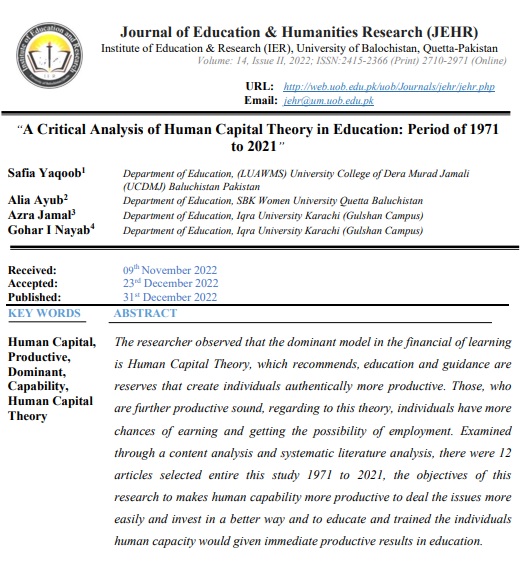A Critical Analysis of Human Capital Theory in Education: Period of 1971 to 2021
Keywords:
Keywords: Human Capital, Productive, Dominant, Capability, Human Capital TheoryAbstract
The researcher observed that the dominant model in the financial of learning is Human Capital Theory, which recommends, education and guidance are reserves that create individuals authentically more productive. Those, who are further productive sound, regarding to this theory, individuals have more chances of earning and getting the possibility of employment. Examined through a content analysis and systematic literature analysis, there were 12 articles selected entire this study 1971 to 2021, the objectives of this research to makes human capability more productive to deal the issues more easily and invest in a better way and to educate and trained the individuals human capacity would given immediate productive results in education.
References
Almendarez, L. J. C. Q. (2013). Human capital theory: Implications for educational development in Belize and the Caribbean. 59(3-4), 21-33.
Bebb, A. M. (1969). Supervisory Conference as Individualized Teaching. Association for Student Teaching Bulletin, No. 28, 1969.
Becker, G. S. (1974). A theory of marriage. In Economics of the family: Marriage, children, and human capital (pp. 299-351): University of Chicago Press.
Bowles, S., & Gintis, H. J. T. A. E. R. (1975). The problem with human capital theory--a Marxian critique. 65(2), 74-82.
Gamble, A. (2014). The Conservative Nation (Routledge Revivals): Routledge.
Guthrie, J., Abeysekera, I. J. J. o. H. R. C., & Accounting. (2006). Content analysis of social, environmental reporting: what is new?
Hyslop-Margison, E. J., & Sears, A. M. (2007). Neo-liberalism, globalization and human capital learning: Reclaiming education for democratic citizenship: Springer.
Iqbal, Z., Vepřek, S., Webb, A., & Capezzuto, P. J. S. S. C. (1981). Raman scattering from small particle size polycrystalline silicon. 37(12), 993-996.
Khalique, M., Ramayah, T., Shah, M. T. A., & Iqbal, Z. J. J. o. m. s. (2019). Intellectual capital and financial performance of banks in Sialkot Pakistan. 6(1), 50-61.
Lewis, M., & Howdle, P. J. Q. (2003). The neurology of liver failure. 96(9), 623-633.
Marconi, G. AN INTRODUCTION TO OECD INTERNATIONAL TERTIARY EDUCATION INDICATORS.
Mian, A. I., Chachar, A. S. J. C., & health, a. m. (2020). Debate: COVID‐19 and school mental health in Pakistan. 25(4), 270-272.
Nerlove, M. (1999). Transforming Economics: Theodore W. Schultz, 1902-1998: In Memoriam. In: JSTOR.
Roksa, J., & Deutschlander, D. J. T. C. R. (2018). Applying to college: The role of family resources in academic undermatch. 120(6), 1-30.
Schultz, T. W. (1971). Investment in human capital. The role of education and of research.
Sisson, G. A., Bytell, D. E., & Becker, S. P. J. T. L. (1977). Mediastinal dissection—1976: Indications and newer techniques. 87(5), 751-759.
Solinger, D. J. (2016). China's Transition from Socialism?: Statist Legacies and Market Reforms, 1980-90: Statist Legacies and Market Reforms, 1980-90: Routledge.
Sultan, G. A. J. I. J. o. P., & Sciences, S. (2015). To analyze the reasons behind the drop out of students at primary level at site town Karachi. 5(3), 113-128.
Tan, H., Cao, J., Zhang, J., & Zuo, Z. J. J. o. n. (2014). Critical role of inflammatory cytokines in impairing biochemical processes for learning and memory after surgery in rats. 11(1), 1-10.
Teixeira, P. J. U. o. P. (2006). Jacob Mincer and the Centrality of Human Capital for Contemporary Labour Economics. 1-17.
Woodhall, M. (1987). Human capital concepts. In Economics of education (pp. 21-24): Elsevier.
Yan, Y. J. J. o. X. a. U. (2018). Analysis of Researches on Badminton in China From1990 to 2017 Based on the Meta Method.




